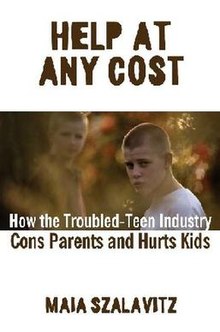 Book cover | |
| Author | Maia Szalavitz |
|---|---|
| Language | English |
| Subject | Tough love, Behaviorism |
| Genre | Non-fiction, Psychology |
| Publisher | Riverhead Books |
Publication date | February 16, 2006 |
| Publication place | United States |
| Media type | Hardback |
| Pages | 336 |
| ISBN | 1-59448-910-6 |
| OCLC | 61169844 |
| 362.74/8/0830973 22 | |
| LC Class | HV1431 .S97 2006 |
Help at Any Cost: How the Troubled-Teen Industry Cons Parents and Hurts Kids is a non-fiction book by Maia Szalavitz analyzing the controversy surrounding the troubled teen industry. The book was published February 16, 2006, by Riverhead Books. Szalavitz focuses on four programs: Straight, Incorporated, a copy of the Straight Inc. program called KIDS, North Star wilderness boot camp, and the World Wide Association of Specialty Programs and Schools. She discusses the background, history and methodology of the troubled-teen industry, including techniques drawn from attack therapy and Synanon. She uses first-person accounts and court testimony in her research, and states that no evidence exists proving that these programs are effective. The book also includes advice for parents and an appendix with additional resources on how to get responsible help for teenagers.
The book received positive reviews in academic journals, literary journals, and in the media. Psychologist Steve K. D. Eichel reviewed the book for Cultic Studies Review and called it a "must read",[1] psychologist and psychiatrist Robert John McAllister described it as "an excellent and informative book on the subject of the 'troubled-teen industry' " in his book Emotions: Mystery Or Madness,[2] and a review in Psychology Today described Szalavitz's work as "a meticulously reported and thoughtful investigation".[3] The book also received positive reviews in Publishers Weekly, Booklist, and Newsday. The book later led to an investigation into the troubled-teen industry by the United States House Committee on Education and Labor of the United States House of Representatives, and Representative George Miller held hearings on the matter in October 2007 and April 2008.